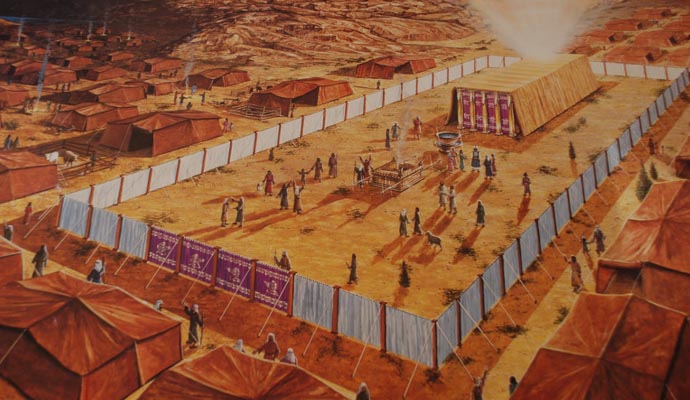#58.1 Stories from the Tanakh: Building the Mishkan
#1 Read and Learn: Half of the book of Exodus/Shemot
 The final half of the book of Exodus (or Shemot) is dedicated to the building of the Mishkan or Tent of Meeting. According to the Hebrew Bible, the tabernacle (Hebrew: מִשְׁכַּן) also known as the Tent of the Meeting (Hebrew: אֹהֶל מוֹעֵד), was the portable earthly dwelling place of God used by the Israelites. Moses was instructed at Mount Sinai to construct and transport the tabernacle with the Israelites on their journey through the wilderness and into the Promised Land. After 440 years, King Solomon’s Temple in Jerusalem replaced it as the dwelling-place of God.
The final half of the book of Exodus (or Shemot) is dedicated to the building of the Mishkan or Tent of Meeting. According to the Hebrew Bible, the tabernacle (Hebrew: מִשְׁכַּן) also known as the Tent of the Meeting (Hebrew: אֹהֶל מוֹעֵד), was the portable earthly dwelling place of God used by the Israelites. Moses was instructed at Mount Sinai to construct and transport the tabernacle with the Israelites on their journey through the wilderness and into the Promised Land. After 440 years, King Solomon’s Temple in Jerusalem replaced it as the dwelling-place of God.
#2 WATCH: The Final Portions of Exodus Explained
Terumah (“Donation”) opens as God tells Moses to collect donated materials in order to build a dwelling place for God called the Mishkan (Tabernacle). God describes how to build the vessels that will fill the Mishkan – including the ark, table, menorah, and sacrificial altar – as well as the Mishkan’s walls and curtains.
- How would you house/keep your most precious things or belongings?
- How would you decide what to build and how to build it?
Tetzaveh (“You Shall Command”) opens as God instructs Moses to appoint Aaron and his sons as priests. God details how to make the priestly clothing, how to sanctify the priests and offer sacrifices during the seven days of inauguration in the Mishkan (Tabernacle), and how to build the golden altar.
- What does it mean to “dress for success”?
- Do you think it’s important to wear a uniform/clothing that fits the job you are doing?
- How do you think dressing according to your job effects how people see you?
Ki-Tisa (“When You Elevate”) opens as God tells Moses to collect a half-shekel donation from all Israelites and to anoint the Mishkan (Tabernacle), its vessels, and the priests. The Israelites worship the golden calf and Moses breaks the tablets. Moses beseeches God to forgive, and returns with a second set of tablets.
- How often do you forget about something when it’s not right in front of your eyes?
- Do you think seeing something happen truly change the way you think about it? What if someone told you a story about something that happened? Is it easier or harder to believe what they said because you didn’t see it yourself?
Vayakhel (“He Assembled”) opens as God commands the Israelites to observe the Sabbath. Moses asks for material donations for the building of the Mishkan (Tabernacle), and the people donate. A group of artisans designated by God begin building the Mishkan and its vessels.
- What does it mean to “bring what you are called to bring”?
- How can you bring what you are called to bring to your everyday life? Or does that saying only apply to important situations?
Pekudei (“Accountings Of”) is the final Torah reading in the Book of Exodus. It describes the making of priestly garments worn in the Mishkan (Tabernacle) and the completion of its construction. At God’s command, Moses erects the Mishkan and puts its vessels in place, and God’s presence fills the Mishkan.
- How do you feel at the end of a long project?
- How do you think the Israelites felt when the Mishkan and all its parts were complete?
#2: Review and Response
- What are the names given to the portable dwelling place of God?
- What were some of the materials used to build it?
- When your family is doing something together and you are asked to participate, do you do what the Israelites did and bring what you are “called to bring” to the event or do you sometimes struggle to do what is asked of you?
- Do you think the Mishkan is still an important part of the Jewish community? How do you think it is represented today?
Need some help? We’re here for you. At any time, if you have any questions, please contact one of our teachers so we can help you. Also, at the end of the session, remember to review your responses in your Tamid Workbook so you can get credit for this lesson. Behatzlacha (Hebrew for good luck)! You can reach Sarah at (646)360-0689 or connect@tamidnyc.org
